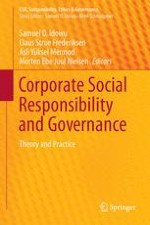2015 | OriginalPaper | Buchkapitel
5. Social Audits and Global Clothing Supply Chains: Some Observations
verfasst von : Muhammad Azizul Islam
Erschienen in: Corporate Social Responsibility and Governance
Aktivieren Sie unsere intelligente Suche, um passende Fachinhalte oder Patente zu finden.
Wählen Sie Textabschnitte aus um mit Künstlicher Intelligenz passenden Patente zu finden. powered by
Markieren Sie Textabschnitte, um KI-gestützt weitere passende Inhalte zu finden. powered by
